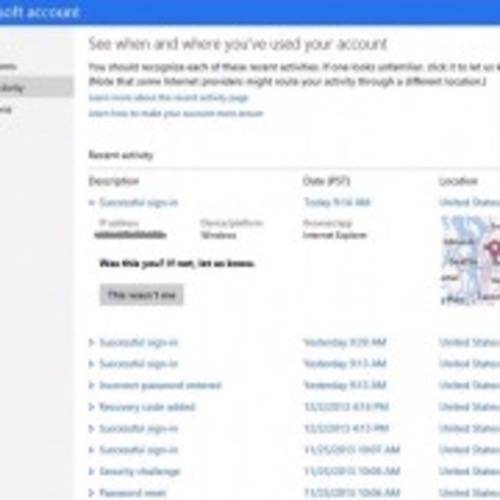
Despite your best efforts in protecting your personal information, you still managed to get your account hacked.
Maybe it was failing to log out of your account after checking your email at the public library; perhaps you wrote your master password on a sticky note and pasted it on your monitor. Either way, Microsoft said this week it is beefing up the security protocols for your Windows accounts, and it’s all your fault.
The updates are designed for your various accounts, whether they are accessed by a Windows PC, Windows Phone, Outlook.com, SkyDrive, Xbox or other places. The security enhancements follow on Microsoft’s introduction of two-factor authentication—for instance, requiring you to enter a security code texted to your smartphone in addition to a password—in April 2012.

One of the major changes lets you see your where and when you signed in and other account activities. Another lets you recover your core password, if by chance you might change both your phone and your email provider at the same time.
“If you see something suspicious, there’s an easy ‘This wasn’t me’ button that will help you take steps to protect your account,” Eric Doerr, group program manager at Microsoft, wrote in a blog post.
Humans Still The Weakest Link
The inherent problem with this software update and most of Microsoft’s security enhancements is that they are reactionary in nature. What’s most needed, say experts, is to train the end user to protect themselves from their own bad computer habits.
Nearly half (49 percent) of federal security breaches are blamed on end users that don’t comply to security rules and protocols, suggests an October 2013 report by federal IT news site MeriTalk and sponsored by network provider Akamai.
End user fault perception is even greater for non government employees. A November 2013 survey by Boardroom Cyber Watch found 54 percent of senior executives interviewed think their own employees pose the biggest threat to corporate security. Only 27 percent of survey respondants feel hackers pose a greater risk.
Unfortunately, the top security concerns by the experts continue to be the most popular Internet activities: surfing the Internet, downloading files, accessing networks, and transferring files, the report mentioned.
That’s something Microsoft (or any software vendor for that matter) cannot protect against.
Graphic provided by Microsoft

















